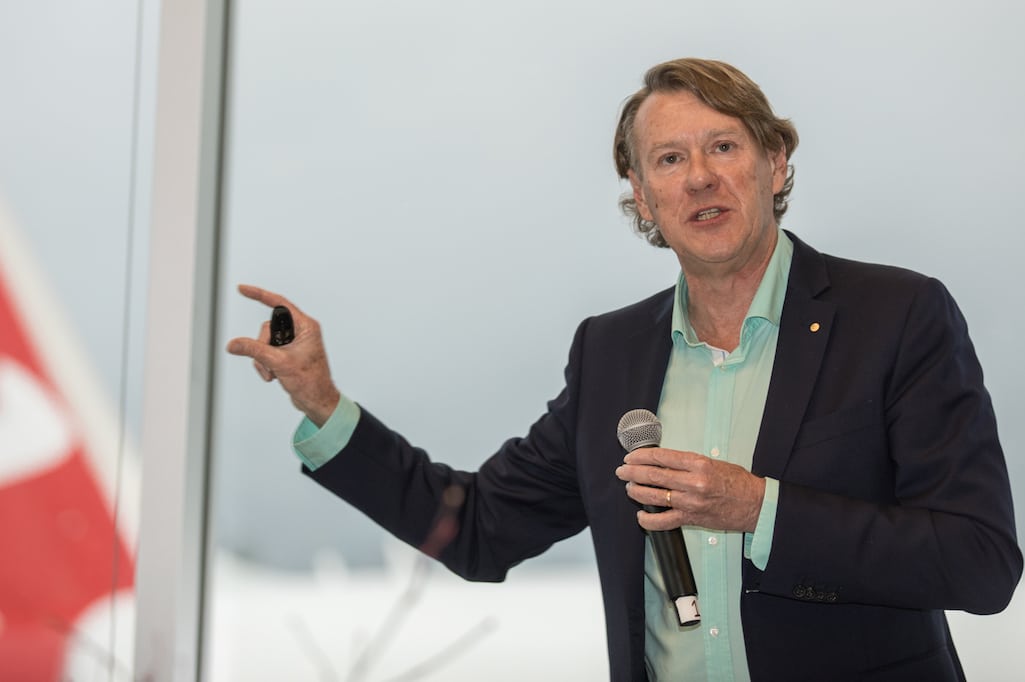Skift Take
Travelers can leverage effective strategies to limit jet lag. There's only one problem. Most people lack the willpower to follow advice from the scientific community. That hasn't stopped Qantas, which hired a specialist to help.
 Every month Skift will profile someone working in the quirkiest, most incredible and surprising jobs in global travel. Skift's relentless curiosity about our industries extends to every corner of the labor market. Who knew jobs like this even existed?
Every month Skift will profile someone working in the quirkiest, most incredible and surprising jobs in global travel. Skift's relentless curiosity about our industries extends to every corner of the labor market. Who knew jobs like this even existed?
Most flyers have felt it in one form or another: the incredible drag of jet lag on their bodies and minds.
Steve Simpson is here to help.
Simpson is director of the Charles Perkins Centre at the University of Sydney, where roughly 1,500 researchers, including philosophers, historians, economists, policy engineers and mathematicians study how to control modern lifestyle diseases, like obesity, cardiovascular disease and diabetes.
Those topics remain his focus, but recently Qantas, Australia’s national airline, asked for his help. In March, it started its first nonstop route to Europe — 17 hours from Perth to London — and it wanted Simpson to design an inflight experience to combat jet lag. Qantas had earlier worked with a professor at the university to develop a new flight planing system that it would allow it to efficently launch some of the world’s longest routes, such as Dallas to Sydney and Perth to London.
Simpson, a frequent flyer and time-zoner crosser, told Qantas he would try, assigning researchers, including professors of dietetics and sleep medicine as well as biomedical engineers, to study long-haul flying. Someday the team could produce academic-quality findings, but for now, researchers are happy to help travelers improve flight experiences.
“It touches everybody, doesn’t it?” Simpson said. “It’s endlessly fascinating. It’s one of those subjects that as soon as you mention it in any context people will perk up their ears and become excited and interested.”
No Cure
The first thing Simpson wants flyers to know is there’s no cure for jet lag.
“There’s so much snake oil,” he said. “You need to appreciate is that you can’t beat it entirely. It is fundamental biology.”
But he has tips. Most importantly, he said, travelers should shift their internal clocks as much as 90 minutes a day for several days prior to departing. Typically, flyers headed East should go to bed and wake up earlier to prepare for long-haul travel, while those flying west should do the opposite. Once there, travelers should acclimate to local time quickly.
“What you need to do is be mindful of the destination time zone and to start easing yourself in that direction by gradually changing when you rest, when you sleep, when you eat, when you’re physically active, when you experience appropriately environmental cues particularly cues associated with life,” he said.
While it’s best when travelers take the initiative, Simpson has worked with Qantas to coax passengers into embracing jet leg-beating strategies. He and his colleagues meet regularly with Qantas executives, an airline spokeswoman said, trading information about the preflight, inflight and post-flight experience.
Simpson and others have made many suggestions. On the longest flights, they recommended cabin crew change cabin lighting — color and intensity — based on where passenger body clocks should be. The approach, Simpson said, “is designed to shift you in the right direction with your biology rather than scrambling even further the biology.”
Food is important, too. Many airlines serve the biggest meals after take off, whether at 10 a.m., 3 p.m. or 11 p.m. But on the Perth-London route, Simpson consulted with physicists to model the optimal eating times for acclimating body clocks, so first meal on the Europe-bound sector is served later than usual.
Many of the meal options include high levels of tryptophan and carbohydrates, which produces melatonin and serotonin.
“What that ensures is that your brain, at the appropriate time —three or four hours before you should be trying to sleep, if you’re going to continue to shift your clock — is getting increased levels of tryptophan, from which your brain can make two of the key hormones that make you go to sleep,” he said.
Researchers at the center also recommend passengers limit alcohol, avoid caffeine and chili peppers, drink lots of water and move around often to feel fresher at their destination.
Simpson knows few passengers take his advice. They may tell him they want strategies for avoiding jet lag, but he knows airplanes are uncomfortable for most travelers, and passengers often make themselves feel better by eating junk food and drinking booze. And many travelers prefer to sleep when tired — not when an academic tells them to.
On ultra-long-haul-segments, Qantas will still feed passengers anything they’d like, so if think a protein and fat-heavy meal will make them feel better, flight attendants will serve it. The same goes for booze and salty snacks.
Simpson said he wants to give passengers information and tools to make better choices. What they do with it is up to them.
“We’re all terribly weak, but knowledge is power,” he said.
Next Steps
Next, Simpson plans to work with Qantas to put medical-grade wrist sensors on volunteers to learn more about what they do inflight, including how they eat and move. Researchers can use the data to infer patterns of rest, though measuring sleep patterns requires different technology. They will also ask passengers questions about their pre-and post-flight activities.
Research could produce medically-significant findings. But already, Simpson’s team has created international news after completing a feasibility for sensors. Researchers tracked 20 customers flying between Perth and London, including one “remarkable” passenger who did not take a step for almost 18 hours, a story the New Zealand Herald headlined, “Man with the cast iron bladder.” (Simpson said the sensor was working.)
Such anecdotes have made Simpson a popular expert, quoted by news organizations worldwide, including the Daily Mail, BBC News, Bloomberg, and Business Insider.
It’s something he didn’t expect years ago in graduate school, when he focused on locusts, learning about their behavior, including what they ate, and why. He discovered locusts prioritized a balanced diet of protein and carbohydrates, and when they ate too many carbohydrates they would overeat until they got enough protein. The research proved this basis of his later work studying human eating habits.
“As a young graduate student sitting in a dark room watching locust feed for hours and hours and on end and analyzing the patterns of behavior and trying to work out the physiology of appetite, could I have imagined working with Qantas all these years later?” he said. “No, no, no. Could I asked anybody to take that notion seriously at the time?
The Daily Newsletter
Our daily coverage of the global travel industry. Written by editors and analysts from across Skift’s brands.
Have a confidential tip for Skift? Get in touch
Tags: airline innovation, airline passenger experience, at your service, jetlag, qantas
Photo credit: Steve Simpson is director of the Charles Perkins Centre at the University of Sydney. Researchers there are working with Qantas on jet lag remedies. Brent Winstone / Qantas
